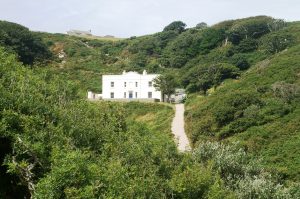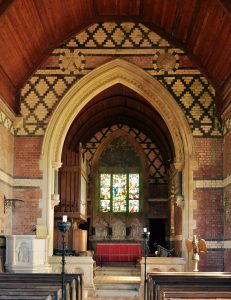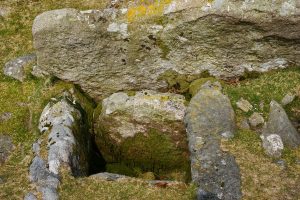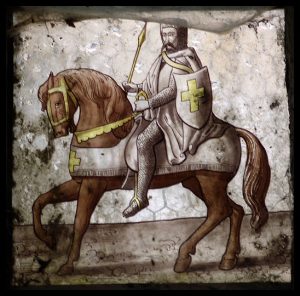
So far in the Story Inspiration series, we’ve looked at why a book’s setting matters so much, discovered Lundy Island and why it’s a nexus of myth and legend, delved into some of my personal nightmares, and explored the historical Pirate Kings who show up in my island’s backstory.
But why is Lundy sometimes called the Kingdom of Heaven? It’s all down to the first of the eccentric millionaires who brought Lundy into the modern era (but still couldn’t shake its troublesome past).

William Hudson Heaven purchased Lundy in 1834, as a summer retreat and a hunting camp. He paid the equivalent of $1.1 million in today’s money.
At the time, there were just six inhabitants on a small farm, with a single lighthouse. The castle and other buildings were in ruins. He claimed it to be a “free island”, and as the island was exempt from property tax, he got away with it.
Heaven made over the island as a personal paradise, building roads, renovating buildings, and constructing cottages for his small army of labourers. He built two lighthouses at the north and south ends of the island to replace the single one on Beacon Hill. His son Reverend Hudson Gossett Heaven built St. Helen’s Church pictured here.
St. Helen’s is a “working” church in the Diocese of Exeter. Since there is no resident priest, services are rarely held. But the church is open to visitors. The original ring of eight bells was restored in 1994 and expanded in 2004. It’s a popular destination for bellringers from all over the world.
The Victorian development of Lundy, and St. Helen’s in particular, inspired much of the fictional history and settings of Brackmor Island in Mr Mottley & the Dying Fall. The Victorian church on Brackmor is called St. David’s. Here’s an excerpt:
St David’s Church perched crisp and tidy against the pale sky. Its peaked roof and square bell tower stood like a beacon of sanity and order, crying “Come now, and let us reason together.” Over the door, a figure stood in a niche inscribed “Dewi Sant”. Inside, the roof soared in full Gothic glory, far out of proportion to the modest size of the nave. A rose window over the door blazed in the sunlight, while clear glass behind the altar overlooked the sea.
“See that?” Julia pointed out a milky white patch in the rose window’s arabesques.
“The only bit that colour,” Mottley noted.
“At sunrise on St Davie’s Day, it makes the shape of a dove over the altar.”
“How esoteric!” Mottley backed up the aisle to get a better look at the window. “I’ve heard a few things about this church from Mr Wickie.”
“Bunkum!” Julia snorted. “There used to be an old church here – and the graves to go with it – but this isn’t it. It probably wasn’t even called St Davie’s. This place was put up by the last owner but one. He buried his whole family here, and went a bit off. He hired a Welshman with monomania to design the place. Must have been Mr Wickie’s cousin or something. They have the same kind of delusions.”
“Oh, Mr Wickie’s delusions are quite special.” Mottley ran his fingers lightly over an inscription on the wall. “Did Wickie paint that picture in your father’s study?”
“Shows, does it?”
“The particular convergence of mythologies… Odin, the Green Man, Herne the Hunter – who isn’t part of the myth at all, but a bit of Shakespeare thrown in – and Arthur the King. Mix well and bake in a hot lighthouse.”
“Listen, Edmund.” Julia came close. “Mr Wickie’s mad. Quite mad. Don’t listen to a word he says. It’s better if you keep away from him altogether.”
Mottley slid his arm around and came up holding her hand lightly. “That’s the third time now you’ve told me to keep away from something. Is the fender hot, Nanny? Is the puddle mucky?”
Julia went stiff, her eyes narrow. She snatched her hand away. “I’m trying to help you. If you don’t like it, fine! You can walk back.” She yanked the church doors open so hard, they crashed against the wall. She gunned the Lagonda’s engine and screeched away.
Mottley gave a long, low whistle. He bobbed his head toward the altar and carefully closed the church doors behind him.
The Heavens’ building and renovation program led to several historical finds, and several members of the family became a keen amateur archeologists. In the 1850’s, farm workers on Lundy were digging foundations for a building extension, and discovered two ancient graves, similar to this one. (The original excavation has been lost. The pictured grave is in Drizzlecombe on Dartmoor in South Devon.)
They were described as enormous granite sarcophagi, eight to ten feet long. The spot was further excavated by expert antiquarians, and the larger of the two skeletons measured 8ft 2 in long. The discovery was recorded in letters and the popular press and became famous as “the Lundy Giant.”
A set of blue glass beads was recovered and sent to the Bristol Museum. It’s generally believed that the skeletons belonged to Viking raiders, possibly the chieftain Hubba the Dane. But their origin and their identity will never be proved – because neither the graves nor the skeletons have ever been seen again, nor any traces found.
 Some contemporary writers believe the giants may have been Knights Templars, instead of Vikings. And those conspiracy theorists maintain that the Templars’ descendants are still active and made sure the burial site and its secrets disappeared forever.
Some contemporary writers believe the giants may have been Knights Templars, instead of Vikings. And those conspiracy theorists maintain that the Templars’ descendants are still active and made sure the burial site and its secrets disappeared forever.
The Heaven family kept the island as a private residence for 80 years, but it was expensive to maintain and the family finances were unstable. They established a granite-quarrying operation, but eventually lost the island to bankruptcy in 1917.
The next owner, Augustus Christie, saw Lundy’s natural beauty and historic ruins as a business opportunity. He converted the Heaven’s homes and cottages to vacation rentals, and ran excursions by steamboat all summer. When he sold Lundy in 1924, it was a vibrant and profitable enterprise.
Next up: From pirate king to Puffin King: Martin Coles Harman, the last King of Lundy.
Know any history/mystery buffs who’d enjoy this series? Please share!
Mister Mottley & the Dying Fall is available now in ebook at your favorite retailer, and in paperback at Amazon and Barnes & Noble.
